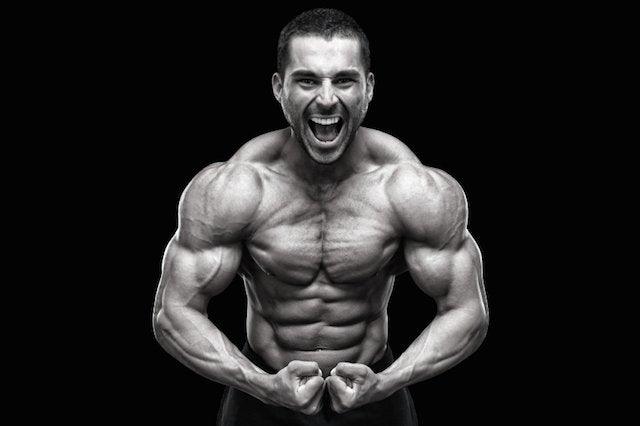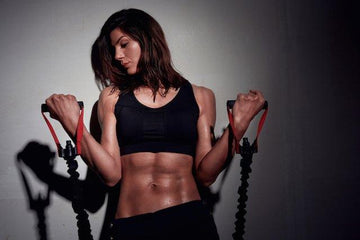

Best Way to Lose Fat: Dieting Harder or More Exercise?
Table of Contents
Best Way to Lose Fat: Dieting Harder or More Exercise? |
by: Robbie Durand
There is no bigger debate among trainers and gym enthusiasts as what is the best way to burn more fat. Some will advocate more exercise with reduced calories and others will recommend more severe calorie restriction with a moderate cardio. Both in extremes is associated with a reduced metabolic rate and loss muscle. The fear of losing muscle is a common phenomenon among bodybuilders, fitness models, and recreational lifters. The dieting athlete is like a fiddler on the roof; he must walk a fine line between diet and exercise because too much of anything will cause a person to topple into the abyss.
A diet that’s too restrictive and eliminates too many foods or groups of food is very likely to contribute to the weakening of bones and to muscle loss. An excellent review paper titled, “Changes in Fat-Free Mass During Significant Weight Loss: A Systemic Review.” is a must read for the science buffs out there who want to look at all the studies. This medical study examined 16 medical and 17 surgical weight-loss studies. The analysis of these studies indicates that very-low-calorie diets provide rapid weight-loss, but also contribute to a substantial loss of fat-free mass (basically everything in your body that isn’t fat). Loss of muscle mass was positively correlated with increased levels of caloric restriction and exercise. So it seems that not matter how hard you try, you will lose some muscle mass with dieting, but exercise prevents the amount of muscle mass loss.
 Researchers examined if calorie restriction by either diet or exercise was more effective for body composition. Subjects were assigned to either a 3-day isocaloric 25% energy depletion by dieting alone or by aerobic exercise alone differently affects appetite and appetite-related hormones, ad libitum feeding, food reward (snack points), and olfaction. Ten male participants participated in this randomized crossover design. 25% daily needs energy deficits induced by diet only and by exercise. Body weight, leptin and ghrelin concentrations, were measured at days 1 and 4. So what the researchers found was fascinating:
Researchers examined if calorie restriction by either diet or exercise was more effective for body composition. Subjects were assigned to either a 3-day isocaloric 25% energy depletion by dieting alone or by aerobic exercise alone differently affects appetite and appetite-related hormones, ad libitum feeding, food reward (snack points), and olfaction. Ten male participants participated in this randomized crossover design. 25% daily needs energy deficits induced by diet only and by exercise. Body weight, leptin and ghrelin concentrations, were measured at days 1 and 4. So what the researchers found was fascinating:
Compared with the control condition, reducing calories by 25% DIET represented a greater acute challenge to appetite regulation than exercise, as demonstrated by greater appetite and amount of food they were allowed to eat. This study confirms that compared with depletions by exercise alone, acute caloric restriction results in rapid changes in appetite that result in compensatory eating, which may initially dissuade potential success in weight-loss efforts. So it seems that dropping calories by dieting too fast is a sure way to make your life miserable with greater increases in hunger compared to more exercise. But it seems that adding more protein is best for dieting.
 Eating 500 more Calories Per Day and Lose More Fat Eating 500 more Calories Per Day and Lose More Fat |
Good news for all guys and girls that love protein, a new study published in the Journal of the International Society of Sports Nutrition reported that a high protein diet in conjunction with a resistance exercise program results in greater losses in body fat.
According to the International Society of Sports Nutrition, their Position Stand on Protein states that protein intakes of 1.4 –2.0 g/kg/day for physically active individuals is not only safe but may improve the training adaptations to exercise training. Thus, a ceiling of 2.0 g/kg/ day is considered the gold standard for protein intake for athletic performance. Many bodybuilders and lifters will eat one gram per pound of bodyweight. If you ask most dieticians, they will say that it’s unnecessary to eat that much protein and the requirements are much lower. It should be noted that other investigators have suggested that trained individuals may have a lower requirement for protein due to increased efficiency of use of protein. Accordingly, several studies have shown that strength training, consistent with the anabolic stimulus for protein synthesis it provides, actually increases the efficiency of use of protein, which reduces dietary protein requirement.
It’s true that many studies have shown that there is a ceiling effect for protein for gaining muscle mass, but new research has shown that extra protein can help you lose bodyfat.
Researchers compared a normal protein and a high protein diet and its effect on body composition. Seventy-three resistance-trained subjects volunteered for the investigation. Subjects were unequally randomized to a:
– Control (normal protein intake). The control group was instructed to maintain the same dietary and training habits over the course of the study.
-High protein (HP) group. The subjects in the high-protein diet group were instructed to consume ≥ 3 grams of protein per kg per day (or ≥3g/kg/day).
Participants were otherwise healthy resistance-trained men and women who had been weight training regularly. Individuals in the normal protein group were instructed to maintain the same dietary habits over the course of the study. On the other hand, subjects in the high-protein group were told to consume ≥ 3g protein/kg/d. The extra protein could be obtained from whole food or protein powder.
At the end of the study, both groups saw decreases in body fat mass and body fat percentage and increases in fat-free mass. The high protein group lost an average of 1.6 kg of fat mass with the standard protein group only lost 0.3 kg. Additionally, the high protein group saw a 2.4% decrease in body fat with the standard protein group saw a 0.6% decrease in body fat. This is the first investigation in which a high protein diet in conjunction with a periodized heavy resistance training program was performed; moreover, subjects did not perform any aerobic exercise during the treatment period.
Although the high protein group consumed 350 more kcals per day for protein than the standard protein group, the high protein diet group saw no change in body weight (-0.1 kg) while the standard protein diet group saw an increase in body weight (1.3 kg). The total caloric surplus in the high protein group was 500 calories more per day, with about 80 of those calories coming from carbohydrates (not statistically significant from the normal protein) and about 350 calories extra from protein (this was statistically different), and about 60 calories from fat
This is quite unusual in that the normal protein group was likely already in a hypercaloric state as they increased their body weight, yet the high protein group that consumed, even more, calories (about 20,000 kcals more over the whole study) did not see an increase in body weight. The high protein group experienced a significantly greater loss of fat mass compared to the normal protein group in spite of the fact that they consumed on average ~400 kcals more per day over the treatment period.
This study also found no harmful effects of consuming a high protein diet on renal function. Thus, professionals who work with athletes (i.e., sports nutritionists, sports dietitians, clinical nutritionists, medical doctors, strength coaches, athletic trainers, etc.) should be aware that athletes can consume very high amounts of protein with no harmful effects over a period of several weeks.
Don’t Try and Lose Weight too Fast
 If you lose weight too fast, you lose more muscle than when you slowly cut back on your calories. Researchers examined the impact of slow and rapid dieting on muscle mass. The researchers put 25 participants on a five-week very-low-calorie diet of just 500 calories per day. Another 22 volunteers went on a 12-week low-calorie diet of 1,250 calories per day. The investigators found that right after the end of their diets, both groups had similar levels of weight loss. The average weight loss was a little over 19 pounds among those on the very-low-calorie diet and just under 19 pounds among those on the low-calorie diet.
If you lose weight too fast, you lose more muscle than when you slowly cut back on your calories. Researchers examined the impact of slow and rapid dieting on muscle mass. The researchers put 25 participants on a five-week very-low-calorie diet of just 500 calories per day. Another 22 volunteers went on a 12-week low-calorie diet of 1,250 calories per day. The investigators found that right after the end of their diets, both groups had similar levels of weight loss. The average weight loss was a little over 19 pounds among those on the very-low-calorie diet and just under 19 pounds among those on the low-calorie diet.
The researchers then looked at the loss of lean muscle mass. Participants on the very-low-calorie diet had lost about 3.5 pounds of fat-free mass, compared with 1.3 pounds among those on the low-calorie diet. Fat-free mass accounted for 18 percent of weight loss in the very-low-calorie diet group and 7.7 percent of weight loss in the low-calorie diet group, the study found. Four weeks after the end of their diets, reductions in fat-free mass averaged 1.8 pounds among those in the very-low-calorie diet group and 0.7 pounds among those in the low-calorie diet group. Fat-free mass accounted for 9.4 percent of weight loss in the very-low-calorie diet group and 2.9 percent of weight loss in the low-calorie diet group, according to the report. So when going on a diet, its important to gradually cut back on your calories to lose bodyfat and not lose muscle.
Antonio J, Ellerbroek A, Silver T, Orris S, Scheiner M, Gonzalez A, Peacock. A high protein diet (3.4 g/kg/d) combined with a heavy resistance training program improves body composition in healthy trained men and women–a follow-up investigation. J Int Soc Sports Nutr. 2015 Oct 20;12:39.

















